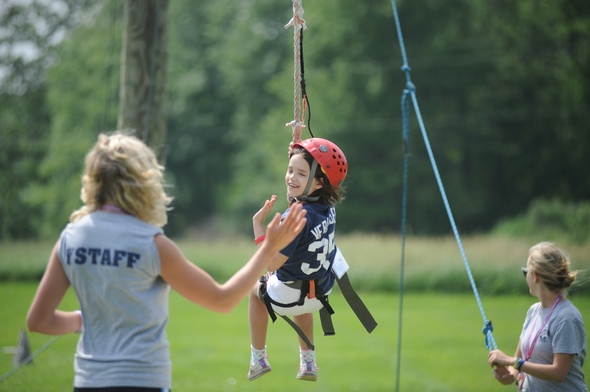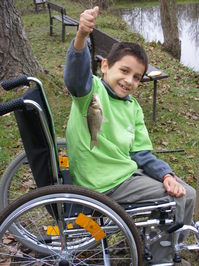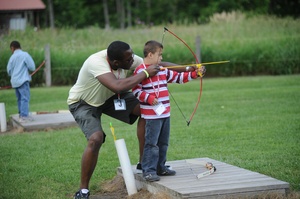North Star Reach camp for ailing children strives for 2014 opening in Pinckney

For one week each year at Camp Michitanki, children with serious health challenges get the assistance they need to participate in typical camp activities, like riding zip lines. The North Star Reach camp in Pinckney, which is expected to open in 2014, will be able to offer activities for those children year-round.
Photo courtesy of Camp Michigan
Now, with $11 million raised toward the capital campaign goal of $26.2 million - and another big fundraiser planned for August - his team is hoping to be ready for construction bids by November so they can break ground in the spring.
If all goes as scheduled, the North Star Reach camp will open in time for the summer 2014 season.
On August 12, the Swim to the Moon and Reach for the Stars open water swim asks supporters to participate in half-mile, 1.2 mile, 5K or 10K swims and raise money through pledges.

Children who have undergone organ transplants get a taste of normal camp life at Camp Michitanki, run by the University of Michigan Transplant Center.
Photo courtesy of Camp Michitanki
“We’re expecting to continue to grow this event, with our goal for this to be ‘the’ event for swimming in the area,” Armstrong said.
Although North Star Reach camp is not yet built, children have been attending summer camp since 2003 via Camp Michitanki, part of the U-M Transplant Center, which is in its 15th year of taking children with serious medical conditions to camp.
Camp Michitanki, directed by Armstrong, leases camping space in Holly from the Detroit YMCA. And though Armstrong is grateful to have a location to hold the camp experience, leasing the space has presented challenges, such as the traveling distance to the U-M Health System in Ann Arbor for children who end up needing urgent medical treatment. The staff has to bring a 24-foot trailer full of medical supplies to set up for one week at camp.
In addition, none of the leased facilities are handicap accessible, so staff and volunteers carry wheelchairs up and down stairs and push them through deep sand. Some of the activities aren’t completely accessible to children with mobility issues. And the camp has to fit into the YMCA’s existing schedule, which means Camp Michitanki can use the site for only one week during the summer.
Armstrong’s goal of a permanent camp started in 2005, when he learned that a piece of U-M property in Pinckney - previously the site of a camp for disadvantaged boys launched by a student association in the 1920s - was up for sale.

A wheelchair won't keep a camper from enjoying some fishing.
Photo courtesy of Camp Michitanki
“[U-M was] preparing to sell [the land] to a developer who was putting condos on it,” said Armstrong, who directed the clinical research center as a nurse in the U-M Transplant Center for many years. “I stopped and said there is something wrong with this. We are leasing space not completely ideal while the university owns space and they are going to sell it.”
It was a great opportunity for Armstrong to propose redeveloping the site in order to define a facility from the ground up that could support a camp experience for children with serious medical challenges.
The 105-acre property in Pinckney sits about two miles west of the town of Hell on a peninsula of land between Paterson and Woodburn Lakes. The property boasts a mature hardwood forest, wetlands, a meadow, a boggy area, waterfront and rolling hills. The camp will be designed as a barrier-free facility with no ramps needed. The team is working with engineers to design buildings with grade entry, so all campers will be able to walk or roll right in the front door.
The children will be able to participate in the same activities that their friends and siblings experience at summer camp - water sports, archery, a climbing wall and zip lines. They will also be able to play in a fully accessible tree house.
“When giving [kids] news of some acute medical condition, all they hear is ‘You can’t do this and you can’t do that,’” said Armstrong. “Then they come to camp and we show them everything they can do.”

A Camp Michitanki participant gets a lesson in archery.
Photo courtesy of Camp Michitanki
Once it is open, the North Star Reach camp is expected to serve 1,500 children each summer at week-long camps. Many existing camps and children’s hospitals have shown interest in participating in the program, which will serve children in the entire Great Lakes region.
With the ability to operate year-round, the camp also will be able to provide educational conferences, respite care, and family camps that will allow parents to meet other families going through similar experiences.
“Even having a weekend activity so the kids can get back together and get the positive energy they get at camp can be a really empowering experience for these kids,” said Armstrong. “It leads to tremendous growth in self-confidence, self-esteem, optimism and hope for the future.”
The families will not be charged for their children to go to camp. Instead, the camp will rely on philanthropy to cover its expenses.
“We don’t want to further burden families who already invested a lot in caring for their family,” said Armstrong.


Comments
Ponddog
Mon, Jul 16, 2012 : 2:29 a.m.
This has been a long journey. It is exciting to see the camp so close to reality. We all need to dig deep to support this one.
lefty48197
Mon, Jul 16, 2012 : 1:15 a.m.
What a great idea! Using this property to help disadvantaged children instead of using it as a playground for snobby overpaid michigan alumni!
lynel
Sun, Jul 15, 2012 : 11:44 p.m.
This sounds like a dream come true for North Star Reach. I couldn't tell from the article if the U of M gave them the property or if they donated it.
lynel
Mon, Jul 16, 2012 : 12:18 a.m.
should have said "if the U of M sold them the property"
David Briegel
Sun, Jul 15, 2012 : 9:16 p.m.
This is a great site for this endeavor. Doug is a great guy. Keep up the good work!!
Will Hassett
Sun, Jul 15, 2012 : 8:31 p.m.
Donations are accepted at: http://www.northstarreach.org/ Thank you!
Klayton
Sun, Jul 15, 2012 : 7:53 p.m.
This camp sounds wonderful! Is there a link where people can donate?